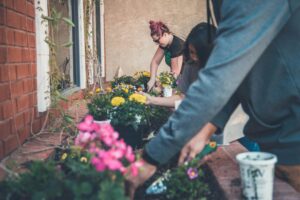Around the world, more people than ever are experiencing homelessness. In the United States alone, more than 50 percent of homeless individuals were also unsheltered in 2023. And according to the United Nations, “1.6 billion people worldwide live in inadequate housing conditions” as of 2020.
So what can we do to help those experiencing homelessness in our own communities? Here are four ideas:
1. Volunteer
Many shelters and soup kitchens seek volunteers for more than just administrative tasks and serving food. Reach out to your local support centers and ask what kind of help they need. While cooks, housekeepers, and social workers are often needed, you may be surprised just how many ways you can help.
If you have specialized skills or expertise, consider volunteering your services. You can partner with a local shelter or offer your services independently by advertising at shelters, food banks, churches, and areas with unhoused populations.

Examples of specialized services include:
- Provide translation services.
- Tutor children and adults, host resume writing workshops, or provide job interview prep.
- Take photographs for ID or job applications.
- Provide free legal clinics or teach financial literacy classes if you have legal or financial expertise.
- Organize and coach sports programs such as basketball or soccer tournaments, dance classes, yoga and meditation workshops, etc.
- Offer haircuts, manicures, or other grooming services.
- Volunteer at free health clinics if you are a medical professional.
- Provide pest control treatments for shelters.
- Donate musical instruments, provide lessons, host concerts, or support free music and arts programs.
- Offer car rides to key events such as job interviews or medical appointments.
- Repair furniture or broken infrastructure at shelters.
2. Donate

If you have items in good condition that you no longer need, you can donate them to local shelters and food pantries. Always contact the center you plan to donate to beforehand to ensure they accept donations. Also, confirm what types of items they do and do not accept.
You can also organize donation drives in your community for specific items. Collecting at schools, sports games, churches, clubs, festivals, and other community events is a great way to maximize donations. Communicate with event hosts to advertise your donation drive ahead of time and set up collection booths at the event itself.
Possible donation items include:
- Food items and baking supplies for food banks, free fridges, and free pantries.
- Electronics such as mobile phones, tablets, laptops to aid applying for jobs, and chargers.
- Toys for families during the holidays.
- Toiletries such as period products, baby supplies, pet supplies, sunscreen, shampoo, soap, and dental care.
- Clothing items such as winter coats, rain jackets, umbrellas, hats, and unused socks and underwear.
- Blankets, pillows, and sleeping bags.
- Furniture such as bed frames or shelving units.
- First aid supplies.
- Books, magazines, puzzles, sporting equipment, and games.
- Bus tickets or transit passes.
- Meals at fast food or other restaurants. Consider inviting unhoused individuals to a sit-down meal.
3. Provide Space
If you own property or know someone who does, consider donating or renovating a space so that it can benefit individuals experiencing homelessness. A house, spare room, yard, garage, or other facility can provide multiple uses. Always be sure to adhere to local laws.

Some ways spaces can help include:
- Offering laundry services by washing clothing and bedding in your machines.
- Create safe parking for those who sleep in cars.
- Provide safe drug disposal sites.
- Create a community garden, including urban gardens.
- Host community meals in your yard or on your sidewalk.
- Offer storage options for personal belongings.
- Install fire pits for warmth and communal storytelling.
4. Advocate
Sometimes simply speaking up goes a long way. You can educate yourself and others about the challenges faced by unhoused people through regular conversations. Casual mentions of important causes can plant the seed in someone’s mind that grows into a desire to help.
Additional ways you can advocate include:
- Participate in local outreach programs.
- Create a peer mentorship program.
- Attend government forums on causes that help unhoused people. For example, policies that support affordable housing or the installation of public restrooms and showers.
- Support organizations and businesses already supporting individuals experiencing homelessness, and encourage others to support them.

